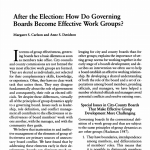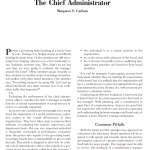Author: Margaret S. Carlson

After the Election: How Do Governing Boards Become Effective Work Groups?
This article identifies some of the factors that make group development more challenging for city and county boards than for other groups, and explains the importance of establishing group norms in the early stages of a board’s development. The authors describe an intervention used to help board members establish effective working relationships. Findings show that boards and managers are better able to avoid many potential conflicts and resolve existing ones by developing early on a shared set of expectations among and for board members, presiding officials, and managers.
Cite as:
Margaret S. Carlson, & Anne S. Davidson. (1999). After the Election: How Do Governing Boards Become Effective Work Groups? State & Local Government Review, 31(3), 190-201. Retrieved from http://www.jstor.org/stable/4355240
…
Continued
“How Are We Doing?” Evaluating the Performance of The Chief Administrator
This article is designed to show how to evaluate a chief administrative officer who reports to a governing board, for simplicity called here the “manager.” Ironically, the reasons that a manager may not receive a regular performance evaluation are the very reasons that an evaluation can be helpful:
- this individual is in a unique position in the
organization; - he or she serves at the pleasure of the board; and
- he or she may frequently receive conflicting messages about priorities and direction from board
members.
Conducting an effective evaluation is hard work, but it doesn’t have to be a bad experience for the board or
the manager. With planning and a commitment to open lines of communication, chances are good that the experience will result in a new level of cooperation and understanding between manager and board and, ultimately, a more effective working relationship.
Cite as:
S. Carlson, Margaret (1994). ” How are we doing?” 1994
…
Continued
